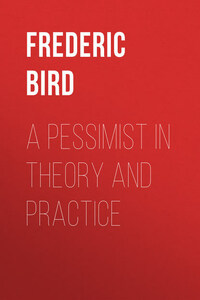I had seen and heard little of Hartman since our college days. There he was counted a youth of eminent promise: after that I knew that he had traveled, written something or other, and practised law – or professed it, and not too eagerly: then he had disappeared. Last May I stumbled on him in a secluded region where I had gone to fish and rest, after a year of too close attention to business. We came face to face in the woods, stared at each other, and then our hands met in the old grip. He took me home with him, to a comfortable enough bachelor establishment, and we made a night – or more than an evening – of it. He did not seem curious, but I was.
"What have you been doing with yourself!" I began; "withdrawing from the world?"
"To some extent," he said. "You can't do that entirely, you know. The world is in you as well as around you, unluckily. It is too much with us, as the poet observed. Do you remember the time you had in class over that sonnet?"
"Pass that," I said. "I've given up poetry." ("I should have thought that impossible," he put in, in his nasty nagging fashion; but I took no notice.) "Where have you been all the time?"
"Here, mostly. It's not much of a place, but that is its merit."
He was getting too deep now, as he often did of old; so I said, "But it's so far away."
"That's its other merit. You always had a direct and ingenuous mind, Bob. Here you've hit both bull's-eyes in two shots."
"None of your chaff," said I. "Who do you practice your wits on, up here?"
"My dogs. And there are some hens in the neighborhood, and a few small farmers. Or if my bosom cries too loudly to be eased of its perilous stuff, I can chaff myself, which is more profitable."
"You were always too clever for me. What else do you do?"
"As the Baroness used to say in The Danicheffs, in our days of vanity, 'Do you think that is much of a compliment?' I read, and fish, and climb, and ride several hobbies, and meditate on Man, on Nature, and on Human Fate."
"What's the good of that?" I was growing impatient of all this nonsense.
"Well, not much, perhaps," said he. "For you, very little indeed. But intrinsically it is about as profitable as more popular avocations."
"Now look here, Hartman," I said. "You're a better man any day than I – or you were. But here you are, hidden in the backwoods with owls (one of them was making a horrid noise outside), and nothing to show. Now I've got a wife – "
"And seven children," he interposed.
"No, only three. But I have a good business, and a house on the avenue, and a decent social position, and I'm making money. And I don't like to see you throw yourself away like this."
"Old man," said Hartman, "we are just of an age, and you would pass for five years the elder. Your hair is getting gray, and thin on top. You look fagged. And you owned to me that you came here to pick up."
He had me there a little. "Yes, I've been working hard. But I'm in the swim. I do as others do. I help to make the wheels go round." I thought I had him there; but you never can count on Hartman, except for an answer of some kind.
"Wouldn't they go round without your help? And why should they go around, anyway? It might be a variety to have them stop. What's the good of it?"
I stared at him; but his eye looked more rational than his talk sounded. "The good of it is that I am in things generally, while you are out."
"Exactly so. I am out, while you are in. As to things generally, I prefer to be with the outs. It is a matter of taste, no doubt."
"Well, you are beyond me. But I brought myself in merely as an example – not that I set up to be much of that – or an illustration, say. I want to know about you." It may have been foolish, but somehow I felt the old affection coming back as we talked. "What does it all mean, Harty?"
He looked at me. "Do you really want to know, Bob?"
"Of course I do. Do you suppose I've forgotten the larks we used to have, and the scrapes you got me out of, and how you coached me through that exam, in Calculus? It's long ago, Jim; but I took it rather hard, the way you dropped me."
He began to look as he used to: he wasn't a selfish fellow in those days. "I never meant to be hard on you, Bob, nor supposed you'd take it so: and I doubt if you did, though you think so at this moment. It was part of a system; and systems are poor things, though we can't do without them. I'll tell you how it was."
"Wait till I fill up. – Now go ahead."
"You don't smoke as you used to, Bob. Does the Madam object?"
"She doesn't like tobacco about the house, of course. And I'm not sure it's good for me."
"Ah. Sorry to be leading you astray. There is no one to interfere with my little vices. Well, Bob, I got tired of it. Not that that alone would matter: one could stand being bored in a good cause. But I couldn't see that it was a good cause."
"Would you mind explaining?" said I. "What cause?"
"Helping to make the wheels go round. Being in the swim. Doing as others do. Trying to make a little money and a little name, and following the fashions of a carnal-minded generation. I could see no point to it, Bob; the game never seemed worth the candle."








